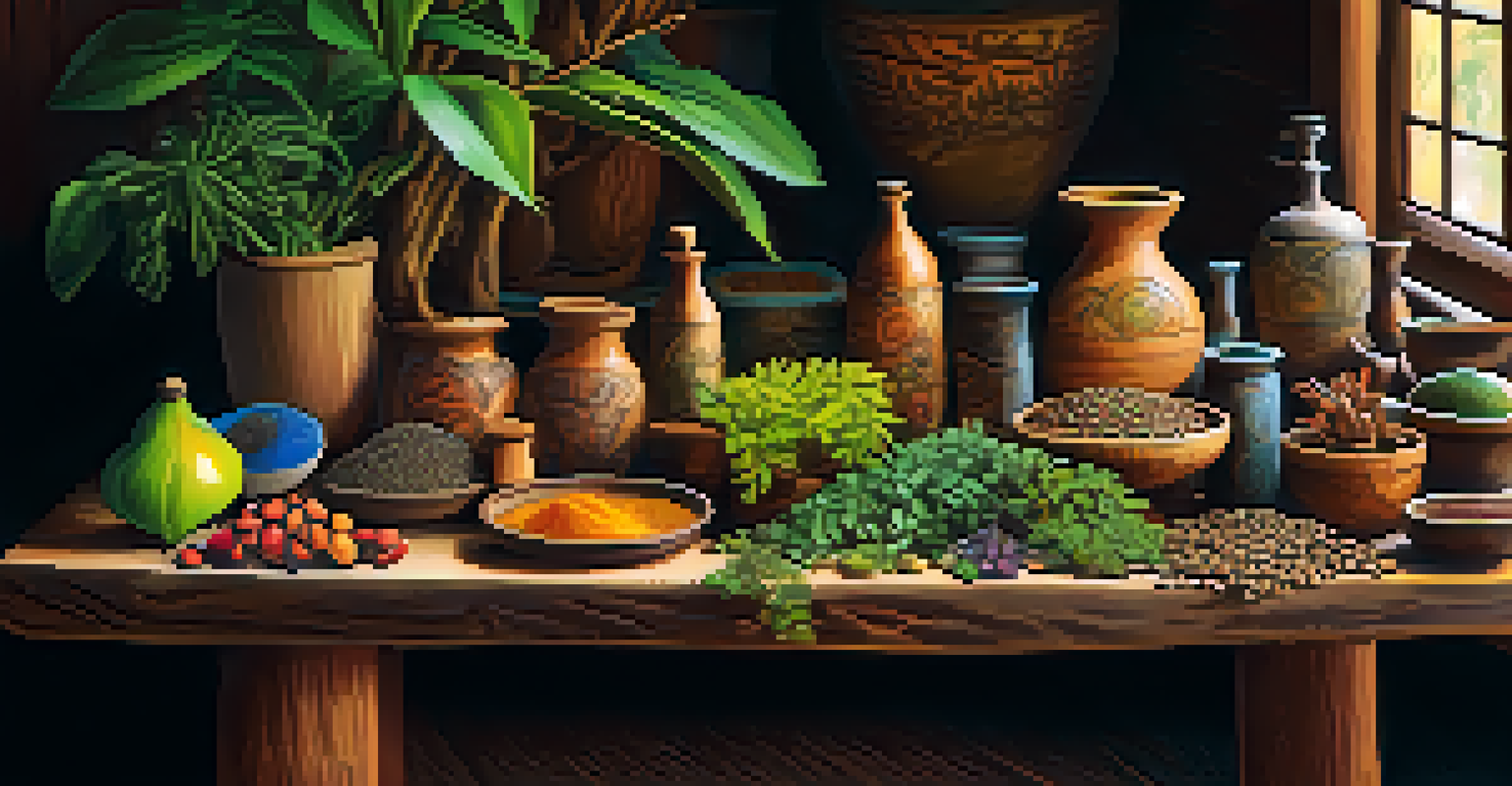The Influence of Western Culture on Ayahuasca Practices

Understanding Ayahuasca: A Brief Overview
Ayahuasca is a traditional Amazonian brew made from the Banisteriopsis caapi vine and other plants. For centuries, indigenous communities in the Amazon have used it in spiritual ceremonies to connect with the divine and facilitate healing. This potent mixture contains DMT, a powerful psychedelic that has drawn interest from outside cultures.
Ayahuasca is not a drug. It’s a teacher. It’s a tool for self-discovery and healing.
The ceremonial use of Ayahuasca often involves guided rituals led by shamans, who are seen as spiritual leaders. These practices are deeply rooted in the cultural beliefs and traditions of the indigenous peoples. Understanding this background is crucial to grasping how Western culture has begun to influence these age-old practices.
As Ayahuasca gained popularity in the West, many people sought out these ceremonies for healing, insight, or personal growth. However, this interest has sparked discussions about cultural appropriation and the authenticity of the experiences being sought.
The Rise of Ayahuasca Tourism
In recent years, Ayahuasca tourism has surged, with travelers flocking to South America for authentic experiences. This influx of Westerners seeking Ayahuasca has transformed local economies, creating a demand for retreats and shamans. While some retreats aim to honor traditional practices, others may prioritize profit over cultural integrity.

This new tourism landscape can lead to a dilution of indigenous practices, as local shamans adapt their ceremonies to cater to foreign expectations. For instance, some have begun to offer shorter, more commercialized versions of traditional ceremonies. Such changes can risk losing the profound spiritual and cultural significance that Ayahuasca holds for indigenous communities.
Cultural Impact of Ayahuasca Tourism
The rise of Ayahuasca tourism has transformed local economies but risks diluting indigenous practices.
As travelers seek transformative experiences, the authenticity of these ceremonies can become blurred. This raises questions about who benefits from these practices and whether the spiritual heritage is being respected.
Western Interpretations of Ayahuasca
Western interpretations of Ayahuasca often emphasize personal growth and psychological healing. Many people approach Ayahuasca as a tool for self-discovery or therapy rather than a spiritual journey. This shift in focus can alter the way the brew is understood and used.
The essence of the Ayahuasca experience is not just about personal healing; it’s about connecting with the spirit of the Amazon and its people.
Books, documentaries, and podcasts have popularized Ayahuasca, framing it as a cure-all for various mental health issues. While there is evidence supporting its therapeutic potential, this perspective can overshadow its cultural significance and spiritual roots. It's essential to remember that Ayahuasca was not originally designed for Western therapeutic frameworks.
This cultural lens can sometimes lead to misconceptions about what Ayahuasca can provide. As more people engage with Ayahuasca through a Western lens, the conversation around its use becomes increasingly complex, blending spirituality with psychology.
Cultural Appropriation vs. Appreciation
As Ayahuasca becomes more popular in the West, discussions about cultural appropriation arise. Many indigenous advocates argue that the commodification of their sacred practices disrespects their cultural heritage. This tension highlights the fine line between appreciation and appropriation.
Cultural appropriation occurs when elements of a culture are taken out of context and used without understanding or respect for their significance. In the case of Ayahuasca, some Westerners participate in ceremonies without acknowledging the deep spiritual context in which they exist. This can lead to a superficial understanding of the practice.
Misconceptions Around Ayahuasca
Many Western interpretations of Ayahuasca focus on personal growth, overshadowing its cultural significance.
On the other hand, cultural appreciation involves recognizing and respecting the original culture while participating in its practices. It's crucial for Western participants to educate themselves about Ayahuasca's origins and the communities that have preserved its traditions for generations.
The Role of Technology in Ayahuasca Practices
Technology has played a significant role in shaping modern Ayahuasca practices, especially in the West. The internet has made information about Ayahuasca widely accessible, allowing people to connect with shamans or retreats from afar. This increase in access can be both beneficial and problematic.
While technology can facilitate connections, it can also lead to misinformation and misrepresentation of traditional practices. Social media often showcases glamorous images of Ayahuasca ceremonies, which can create unrealistic expectations for participants. This potential for distortion can detract from the authentic experience that many seek.
Moreover, the rise of online forums and communities allows for the sharing of experiences, which can help demystify Ayahuasca. However, it's essential to approach such platforms critically to ensure that the information is accurate and respectful of the culture from which Ayahuasca originates.
Integration of Ayahuasca Experiences
After participating in an Ayahuasca ceremony, many individuals emphasize the importance of integration. Integration refers to the process of making sense of the experiences and insights gained during the ceremony. This step is crucial for turning profound realizations into actionable changes in one’s life.
In Western contexts, integration often involves therapy, support groups, or workshops designed to help individuals process their experiences. Many participants find it beneficial to discuss their insights with trained professionals who understand the psychological implications of such journeys. This approach can create a safe space for healing and growth.
Navigating Cultural Appropriation
Discussions about cultural appropriation highlight the need for respectful engagement with Ayahuasca's traditions.
However, the integration process can sometimes overlook the cultural practices that indigenous communities have historically used. These communities have their own methods for processing Ayahuasca experiences, often involving ongoing community support and spiritual guidance. Acknowledging and respecting these traditions can enhance the integration process for Western participants.
Future Directions for Ayahuasca Practices
As Ayahuasca continues to gain traction in Western culture, its future remains uncertain. The blending of traditional practices with Western interpretations prompts questions about sustainability and authenticity. Striking a balance between honoring the original culture and catering to new audiences will be vital.
One potential direction is the establishment of ethical guidelines for Ayahuasca tourism and practices. Educating both Western participants and indigenous communities about respectful engagement can create a more harmonious relationship. This might involve creating certification programs for retreats that prioritize cultural integrity and spiritual authenticity.

Ultimately, the future of Ayahuasca practices depends on mutual respect, understanding, and collaboration between Western seekers and indigenous communities. As we navigate this evolving landscape, it's essential to listen to the voices of those who have preserved these traditions for generations.